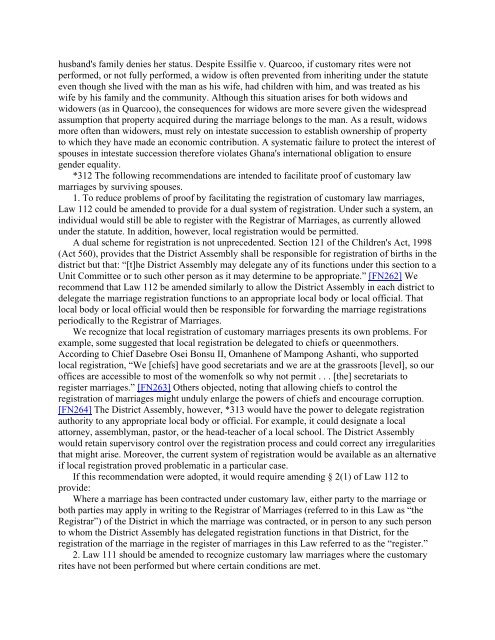Law, Culture and Women's Inheritance Rights in ... - Leitner Center
Law, Culture and Women's Inheritance Rights in ... - Leitner Center
Law, Culture and Women's Inheritance Rights in ... - Leitner Center
You also want an ePaper? Increase the reach of your titles
YUMPU automatically turns print PDFs into web optimized ePapers that Google loves.
husb<strong>and</strong>'s family denies her status. Despite Essilfie v. Quarcoo, if customary rites were not<br />
performed, or not fully performed, a widow is often prevented from <strong>in</strong>herit<strong>in</strong>g under the statute<br />
even though she lived with the man as his wife, had children with him, <strong>and</strong> was treated as his<br />
wife by his family <strong>and</strong> the community. Although this situation arises for both widows <strong>and</strong><br />
widowers (as <strong>in</strong> Quarcoo), the consequences for widows are more severe given the widespread<br />
assumption that property acquired dur<strong>in</strong>g the marriage belongs to the man. As a result, widows<br />
more often than widowers, must rely on <strong>in</strong>testate succession to establish ownership of property<br />
to which they have made an economic contribution. A systematic failure to protect the <strong>in</strong>terest of<br />
spouses <strong>in</strong> <strong>in</strong>testate succession therefore violates Ghana's <strong>in</strong>ternational obligation to ensure<br />
gender equality.<br />
*312 The follow<strong>in</strong>g recommendations are <strong>in</strong>tended to facilitate proof of customary law<br />
marriages by surviv<strong>in</strong>g spouses.<br />
1. To reduce problems of proof by facilitat<strong>in</strong>g the registration of customary law marriages,<br />
<strong>Law</strong> 112 could be amended to provide for a dual system of registration. Under such a system, an<br />
<strong>in</strong>dividual would still be able to register with the Registrar of Marriages, as currently allowed<br />
under the statute. In addition, however, local registration would be permitted.<br />
A dual scheme for registration is not unprecedented. Section 121 of the Children's Act, 1998<br />
(Act 560), provides that the District Assembly shall be responsible for registration of births <strong>in</strong> the<br />
district but that: “[t]he District Assembly may delegate any of its functions under this section to a<br />
Unit Committee or to such other person as it may determ<strong>in</strong>e to be appropriate.” [FN262] We<br />
recommend that <strong>Law</strong> 112 be amended similarly to allow the District Assembly <strong>in</strong> each district to<br />
delegate the marriage registration functions to an appropriate local body or local official. That<br />
local body or local official would then be responsible for forward<strong>in</strong>g the marriage registrations<br />
periodically to the Registrar of Marriages.<br />
We recognize that local registration of customary marriages presents its own problems. For<br />
example, some suggested that local registration be delegated to chiefs or queenmothers.<br />
Accord<strong>in</strong>g to Chief Dasebre Osei Bonsu II, Omanhene of Mampong Ashanti, who supported<br />
local registration, “We [chiefs] have good secretariats <strong>and</strong> we are at the grassroots [level], so our<br />
offices are accessible to most of the womenfolk so why not permit . . . [the] secretariats to<br />
register marriages.” [FN263] Others objected, not<strong>in</strong>g that allow<strong>in</strong>g chiefs to control the<br />
registration of marriages might unduly enlarge the powers of chiefs <strong>and</strong> encourage corruption.<br />
[FN264] The District Assembly, however, *313 would have the power to delegate registration<br />
authority to any appropriate local body or official. For example, it could designate a local<br />
attorney, assemblyman, pastor, or the head-teacher of a local school. The District Assembly<br />
would reta<strong>in</strong> supervisory control over the registration process <strong>and</strong> could correct any irregularities<br />
that might arise. Moreover, the current system of registration would be available as an alternative<br />
if local registration proved problematic <strong>in</strong> a particular case.<br />
If this recommendation were adopted, it would require amend<strong>in</strong>g § 2(1) of <strong>Law</strong> 112 to<br />
provide:<br />
Where a marriage has been contracted under customary law, either party to the marriage or<br />
both parties may apply <strong>in</strong> writ<strong>in</strong>g to the Registrar of Marriages (referred to <strong>in</strong> this <strong>Law</strong> as “the<br />
Registrar”) of the District <strong>in</strong> which the marriage was contracted, or <strong>in</strong> person to any such person<br />
to whom the District Assembly has delegated registration functions <strong>in</strong> that District, for the<br />
registration of the marriage <strong>in</strong> the register of marriages <strong>in</strong> this <strong>Law</strong> referred to as the “register.”<br />
2. <strong>Law</strong> 111 should be amended to recognize customary law marriages where the customary<br />
rites have not been performed but where certa<strong>in</strong> conditions are met.


